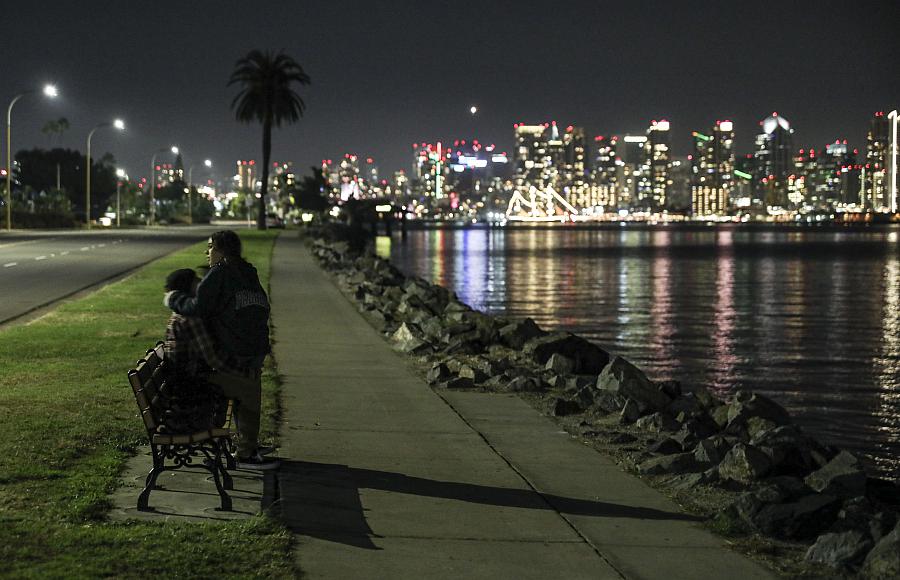Should California disclose COVID-19 workplace outbreaks?

San Diego, California.
(Photo by Sandy Huffaker/Getty Images)
During the pandemic, people throughout the country have used news about COVID-19 outbreaks to make day-to-day decisions, like where to travel, when to send their kids to school and when to just stay home.
Now courts in California are deciding how much of that information should be public. Health reporters — and any journalist who relies on public records — may want to follow this case because of the precedent it could set on the release of coronavirus data.
Last year, three San Diego news outlets sued San Diego County, arguing that its refusal to release the locations of outbreaks violated the state’s Public Records Act. The county’s health officer claimed she was withholding the data so people wouldn’t be scared off from cooperating with public health officials working to stop the spread of the virus.
This July, a state appellate court sided with the county. Freedom of information advocates are now asking that the California Supreme Court review the case, which was filed by Voice of San Diego, the San Diego Union-Tribune and KPBS.
“The government is acting for the public — we've given them this responsibility,” Monica Price, a legal fellow with the northern California-based First Amendment Coalition, told me. “And in turn, it's their responsibility to show us what they're doing.”
In a letter asking the state Supreme Court to take on the case, the coalition called this “a time when access to information can very well be a matter of life or death.”
“The way I see it, journalists and the media right now are filling in the gaps, keeping the public informed,” Price said.
Her organization noted that it was the Bay Area News Group — and not the state health department — that built the first centralized database of workplace outbreaks in California. However, only about a third of counties provided specific information on outbreaks, which is defined as three or more COVID-19 cases at the same place within a two-week time period.
After the Bay Area News Group published its report, Santa Clara County (home to San Jose) decided to make its data public. Asked why the county hadn’t done so sooner, the county’s executive told the news outlet they were “too trusting” that employers were notifying their workers about outbreaks.
“If this is a way that we can keep people informed and help them make informed decisions about coming to work, then it's vitally important,” Price said. “On a personal level, I would want to know if I was coming into a workplace that had a COVID outbreak recently.”
Dr. Wilma Wooten, the San Diego County health officer, has argued that releasing the exact locations of outbreaks would make the public less safe by discouraging participation in contact tracing. (The news organizations countered that she didn’t cite any research showing this would be the case.)
“We are not in the business of stigmatizing individuals for contracting an illness, creating a false sense of security or publicly shaming a business or organization for doing the right thing and working with us to help rein in this pandemic,” she wrote in an op-ed for the San Diego Union-Tribune.
She added that some of the businesses are so small that disclosing an outbreak could allow people to identify which employees had COVID-19.
Wooten has also stated there is “no correlation between the location of an outbreak and the risk of later catching the virus at that same location,” according to court transcripts.
“An ‘outbreak’ does not mean individuals contracted the virus at that outbreak location,” she said. “It means only that three or more individuals, from different households, all tested positive for COVID-19 and visited or worked in that location during a certain window of time.”
When denying records requests, public officials in California often cite section 6255 of the state’s Public Records Act. Known as the “catch-all exemption,” it allows government agencies to conceal information they deem sensitive.
“In other words, regular people may have a good reason to view a record, but officials have a more compelling reason for not sharing it,” Jesse Marx wrote for Voice of San Diego. “Reporters and open government advocates have long viewed the catch-all exemption as an escape valve for whatever officials decide, unilaterally, should be kept secret.”
The burden is then on the agency to prove that damage would occur if the information is made public. So far in California, the courts believe San Diego County has done so.
Price, the legal fellow, told me that reporters who run into public records denials should push back and make sure government agencies cite the laws used to justify their decision. The journalists can then reach out to her organization or similar ones in their own state for help.
“We try to figure out if (the agency) did this correctly, because we find that a lot of times it seems like government transparency is an afterthought,” Price said. “Whether it's a mistake, they’re misinformed or they're really trying to keep something secret that they shouldn't, it's always worthwhile to get a second opinion.”

